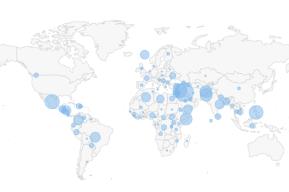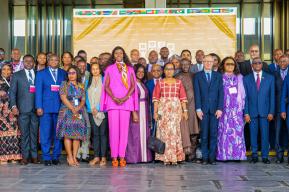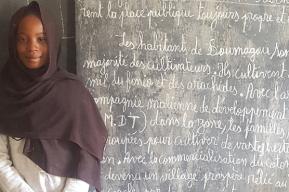Meet Adama
In 2017, Adama was forced to leave her hometown with her family to flee from inter-communal conflict between the Peul and Dogon ethnic groups in Mopti, central region of Mali, heavily affected by violence and war. She and her family are living in a refugee camp on the outskirts of Bamako.
In addition to security concerns, Mali faces poverty, limited access to basic services, cultural norms and social practices that hinder the progress of girls and women, especially when it comes to education. Over half of Mali’s youth aged 15 to 24 are not literate. And according to national statistics, 53% of the girls in Mali are married before the age of 18.
Adama had the chance to return to school in 2018 through the joint work of UNESCO, UNFPA and UN Women to reintegrate internally displaced children into the formal school system in Bamako. This work was paired with financial support for school supplies (school bags, notebooks, school uniforms, books) provided to children like Adama to facilitate school attendance.
At school, Adama learned to read and write in French, learned to speak Bambara, the local language used in Bamako, and even made new friends. ‘I like learning’, says Adama. ‘My first language is Fulfulde but I also can speak Bambara. I learned this language with my classmates at school.’
Impacts of COVID-19 on girls’ education
As Adama’s life was finding some normalcy despite her life in the refugee camp, the COVID-19 outbreak interrupted her learning once again. In March 2020, all educational institutions in Mali closed their doors to contain the spread of COVID-19 until mid-September. Alongside Adama, over 1.7 million girls and young women were out of school in Mali at the peak of the pandemic, and 2 million children did not have access to alternative learning opportunities.
‘I'm sad because we don't study anymore’, says Adama. ‘Now, every day, I go with other children to fetch firewood for cooking in the areas around the camp.’ At the camp, Adama does not have access to the internet to continue learning remotely, and no support is currently provided from her school. Instead, she has taken up household chores.
Girls like Adama living in refugee camps are more vulnerable as existing barriers to education are reinforced by circumstances. Related risks include increased demand for carework, higher rates of gender-based violence, early and forced marriage, unintended pregnancy and the widening of the already existing gender digital divide.
However, Adama has not lost hope. ‘I often read my books and notebooks to keep learning’, she says.
Engaging parents is key
‘An educated person is more important than an illiterate one’, says Aminata Traore, Adama’s mother. ‘I want her to study and get a good job after she finishes school.’
Aminata is proud that her daughter was able to integrate life in Bamako, learning the local language as well as beginning to understand and speak French. She recognizes the importance of education and literacy for her daughter’s future.
Aminata hopes that teachers will help Adama continue her path to education despite the health situation. ‘When school resumes, I will help her go back to school’, says Aminata. ‘I will find a way to buy school supplies for her to continue her education. I don't want her to interrupt her studies.’
During the COVID-19 crisis, the UNESCO-UNFPA-UN Women Joint Programme has provided technical support to the government in Mali to organize and disseminate refresher courses for learners through the national television channel. Awareness-raising messages were also disseminated within communities, sensitizing parents to relieve girls from domestic tasks so they can attend remedial classes through radio and television, and encouraging the reporting of gender-based violence incidents through a toll-free number.
Adama has returned to school since September as her school reopened. She urges leaders to do all they can to end the war so she and her family can return to their hometown and ensure that girls like herself are able to continue their education.
UNESCO and Global Education Coalition partners recently launched a campaign to ensure that every girl is able to learn while schools are closed and return to the classroom when schools safely reopen.







